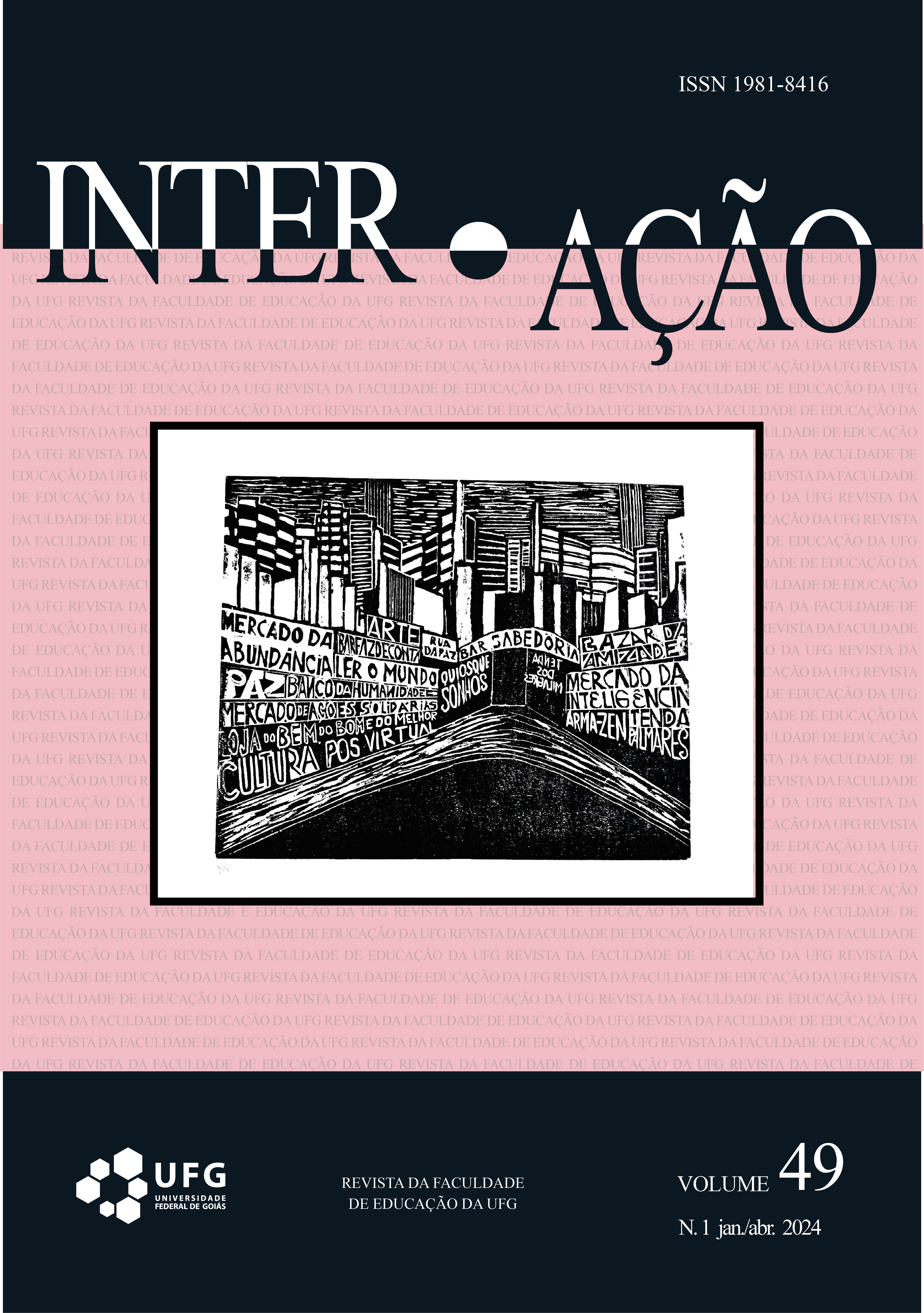DIDACTIC ELEMENTS OF TECHNICISM AND NEOTECHNICISM IN THE HISTORY OF PEDAGOGICAL IDEAS: THE CENTRALITY OF TECHNIQUES AND TECHNOLOGIES
DOI:
https://doi.org/10.5216/ia.v49i1.76654Keywords:
Educational Work; Pedagogical Ideas; Technicism; Neotechnicism.Abstract
This paper presents the results of a theoretical-bibliographical and conceptual research on the didactic-pedagogical elements that make up technicism and neotechnicism in Brazilian education. Through the formulations that support these conceptions, we sought to analyze the conceptualization of the place of techniques and technologies used to justify their use in educational work. It is concluded that there is a need to overcome these conceptions as a contribution to a human formation that aims at the active insertion of the subject in social practice to transform it.
Downloads
References
ARAUJO, R. M. de L. As referências da pedagogia das competências. Perspectiva, Florianópolis, v. 22, n. 02, p. 497-524, jul./dez. 2004. Disponível em: https://periodicos.ufsc.br/index.php/perspectiva/article/view/9664. Acesso em: 26 jan. 2024.
AUDINO, D. F.; NASCIMENTO, R. da S. Objetos de Aprendizagem – Diálogos Entre Conceitos e uma Nova Proposição Aplicada à Educação. Revista Contemporânea. Rio de Janeiro, v. 5, n. 10, p. 128-148, 2010. Disponível em: https://revistas.ufrj.br/index.php/rce/article/view/1620. Acesso em: 26 jan. 2024.
BERTALANFFY, L. von. Teoria geral dos sistemas: fundamentos, desenvolvimento e aplicações. Trad. Francisco M. Guimarães. 5º ed. Petrópolis-RJ: Vozes, 2010.
CALLENDER, P. Como preparar e utilizar a instrução programada. Trad. Orlando Agueda. Rio de Janeiro: Forum Editora, 1972.
CANDAU, V. M. Ensino programado: uma nova tecnologia didática. Rio de Janeiro: Iter Edições, 1969.
COBURN, P, et al. Informática na Educação. Tradução Gilda Helena B. Campos Novis. Rio de Janeiro: Livros Técnicos e Científicos Editora, 1988.
DELORS, Jacques. Educação: um tesouro a descobrir: Relatório para a UNESCO da Comissão Internacional sobre Educação para o Século XXI. Tradução de José Carlos Eufrázio. São Paulo: Cortez Editora. Brasília: Unesco, 1998.
DUARTE, N. O debate contemporâneo das teorias pedagógicas. In: MARTINS, Lígia Márcia; DUARTE, Newton. (orgs.) Formação de professores: limites contemporâneos e alternativas necessárias. São Paulo: Editora UNESP; São Paulo: Cultura Acadêmica, 2010, p. 33-49.
FERREIRA, B. de J. P.; DUARTE, N. O lema aprender a aprender na literatura de informática educativa. Educ. Soc., Campinas, v. 33, n. 121, p. 1019-1035, out.- dez. 2012. Disponível em: https://www.scielo.br/j/es/a/BrY9hVzyHB4WgSSmZ4KWBYt/abstract/?lang=pt. Acesso em: 26 jan. 2024.
GONZALEZ, J. A. Das máquinas de ensinar aos objetos virtuais de aprendizagem: tecnicismo e neotecnicismo na educação brasileira. 2022. Tese. (Doutorado em Educação) – Faculdade de Educação, Universidade Estadual de Campinas, Campinas, SP, 2022. Disponível em: https://hdl.handle.net/20.500.12733/6702. Acesso em: 12 jun. 2023.
KUENZER, A. Z.; MACHADO, L. R. de S. A pedagogia tecnicista. In: MELLO, G. N. de. (org.). Escola Nova, Tecnicismo e Educação Compensatória. São Paulo: Edições Loyola, 1984, p. 29-52.
LYSAUGHT, J. P.; WILLIAMS, Clarence M. Guia de Instrução Programada. Trad. de Samuel Pfromm Netto. São Paulo: Pioneira, 1974.
MALPASS, L. F. O comportamento humano: um programa para auto-aprendizagem. Trad. Juracy C. Marques. 2ª ed. Rio de Janeiro: Editora Renes, 1970.
MORAN, J. M. Ensino e a aprendizagem inovadores com apoio de tecnologias. In: MORAN, José Manuel; MASETTO, Marcos T.; BEHRENS, Marilda Aparecida. Novas tecnologias e mediação pedagógica. 21ª ed. Campinas, SP: Papirus, 2013, p. 11-72.
PAPERT, S. A máquina das crianças: repensando a escola na era da informática. Trad. Sandra Costa. Porto Alegra: Artes Médica, 1994.
PARRA, N; PARRA, I. C. da C. Técnicas audiovisuais de educação. 5ª ed. São Paulo: Pioneira, 1985.
PERRENOUD, P. Construir as Competências desde a escola. Porto Alegre, Artmed, 1999.
PERRENOUD, P. Dez novas competências para ensinar. Porto Alegre: Artmed, 2000.
PRETTO, N. de L. Uma escola sem/com futuro: educação e multimídia. 7ª ed. Campinas, SP: Papirus, 1996.
RAMOS, C. Engenharia da Instrução. Rio de Janeiro: Bloch; FENAME, 1977.
RAMOS, M. N. A pedagogia das competências: autonomia ou adaptação? São Paulo: Cortez, 2001a.
RAMOS, M. N. A pedagogia das competências e a psicologização das questões sociais. Boletim Técnico do SENAC. [s. l.], v. 27, n. 3, p. 26-35, mar. 2001b. Disponível em: https://www.bts.senac.br/bts/article/view/573. Acesso em 04 mar. 2024.
SAVIANI, D. História das ideias pedagógicas. Campinas, SP: Autores Associados, 2007.
SKINNER, B. F. Tecnologia do Ensino. Trad. Rodolpho Azzi. São Paulo: EPU, 1972.
SOUZA, R. F. de. Objetos de ensino: a renovação pedagógica e material da escola primária no Brasil, no século XX. Educar em Revista, Curitiba, n. 49, p. 103-120, jul./set. 2013. Disponível em: https://www.scielo.br/j/er/a/v96Y4G9VS9fbKyQr87cRJ6r/abstract/?lang=pt. Acesso em: 26 jan. 2024.
ZABALA, A.; ARNAU, L. Como aprender e ensinar competências. Trad. Carlos Henrique Lucas Lima. Porto Alegre: Penso, 2014.
Published
How to Cite
Issue
Section
License
Copyright (c) 2024 Jeferson Anibal Gonzalez

This work is licensed under a Creative Commons Attribution-NonCommercial 4.0 International License.
Inter-Ação uses the Creative Commons Attribution 4.0 License for Open Access Journals (Open Archives Initiative - OAI) as the basis for the transfer of rights. Open access means making documents available on the Internet free of charge, so that users can read, download, copy, distribute, print, search, or link to the full text of documents, process them for indexing, use them as input data for software programs, or use them for any other lawful purpose, without financial, legal, or technical barriers.
Authors publishing in this journal agree to the following conditions:
1) Authors retain copyright and grant the journal the right of first publication, with the work simultaneously licensed under the Creative Commons Attribution License, which permits redistribution of the work with attribution and first publication in this journal.
2) Authors are permitted to enter into additional, separate agreements for non-exclusive distribution of the version of the work published in this journal (e.g., for publication in an institutional repository or as a book chapter), with attribution and first publication in this journal.
3) Authors are permitted and encouraged to publish and distribute their work online (e.g. in institutional repositories or on their home page) at any time before or during the editorial process, as this may generate productive changes as well as increase the impact and citation of the published work.















